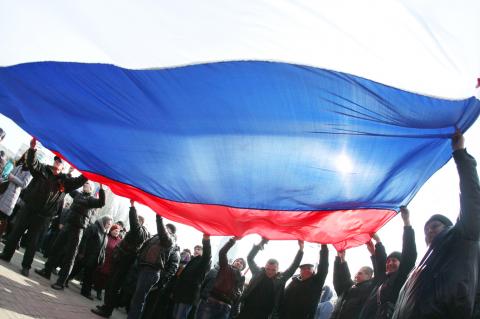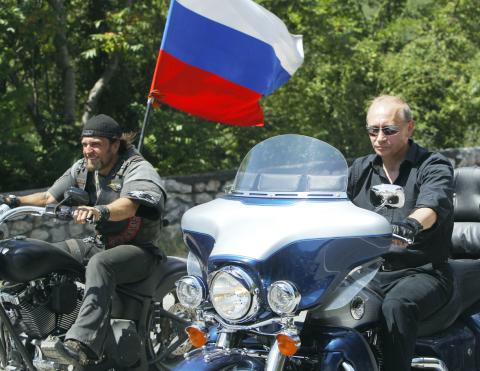Russian President Vladimir Putin loves to be seen astride a Harley-Davidson with members of pro-Russian Crimean motorcycle gang the Night Wolves.
Now, that same gang is out in force in the Crimean city of Sevastopol as “patriots” rise up against the Ukraine’s new leaders in Kiev.
“The people of Sevastopol are the most patriotic on the planet,” said Dimitry Sinichkin, the leather-jacketed leader of the fearsome biker gang. “They have come out to defend their families and country.”

Photo: AFP
As the Ukraine’s stability continues to unravel, Sinichkin and his squad of tattooed men have become apparent outriders for what could be a full-scale Russian military advance on the Crimean Peninsula.
Sevastapol — the second-largest port in the Ukraine — is at the sharp end of what increasingly resembles a Cold War-style crisis.
On Saturday, Putin won parliamentary approval to send troops into the Ukraine as Moscow looked set to recall its ambassador from the US. Throughout Crimea, it is now a question of waiting for the troops who will surely follow in the wake of that decision.

Photo: AFP
With muscular factions such as the Night Wolves already on the ground and Kremlin supporters staging violent demonstrations in major cities of the Ukraine’s eastern and southern areas, there are already plenty of would-be patriots prepared to welcome them.
Unidentified gunmen, some reportedly linked to Russian military units, have besieged airports and the local parliament in Crimea over the past few days, raising international tensions over Moscow’s intentions.
Armored personnel carriers can be seen rolling along the highways, while Russian hardliner and Kremlin politician Vladimir Zhirinovsky has been rousing crowds by bellowing into microphones about Moscow’s military might. In town centers, crowds of babushkas can be heard chanting: “To Russia, to Russia,” their fur hats askew.
The Night Wolves are the latest addition to this circus. They say they are ready to defend Crimea against all unwanted intrusions, namely Western authorities and the new administration in Kiev, seen by many in the region as bandits and terrorists who seized power illegally.
The Crimean Peninsula is predominantly Russian-speaking and despite splitting away from their eastern neighbor 60 years ago, many in the region still look longingly over the border to what they see as their motherland. Strong geographical and historical ties to Russia are bolstered by the presence of Moscow-run naval and military bases dotted around the region.
With the emergence of pro-Russian military groups and the looming threat of deployments from across the border, the question of who is now in charge in Crimea is unclear.
On Saturday, newly installed Sevastopol Mayor Aleksei Chaliy pledged to subordinate himself to the local security forces, which presumably include the Night Wolves.
Born in Moscow out of an anti-Soviet rock culture in the 1980s, the Night Wolf biking gang — whose logo is a flaming wolf’s head — now have branches across the Slavic world, including Bulgaria, Bosnia, Serbia and the Ukraine.
Crimea is the heartland of the gang’s Ukrainian chapter.
“We are all around Crimea, Simferopol and Sevastopol — everywhere,” the blue-eyed Sinichkin said. “Our numbers are not great, but we move around fast.”
The Night Wolves will not reveal precisely how many members they have, but across the region they claim that more than 20,000 men can be mobilized quickly, alongside other pro-Russian groups.
“I am sure you have seen our work when you came into the city,” Sinichkin said with a wry smile.
The gang claim to have set up five or more road blocks to police all traffic entering Sevastopol. They say they are being supported by other ad hoc civilian defense units that have sprung up over the past week.
The bikers claim to be politically unaligned, but say they are “cooperating closely” with the local authorities.
“The police support our work,” said Sinichkin, who has known the pro-Russian Chaliy for more than 15 years and counts high-ranking Ukrainian and Russian politicians as close friends.
“Who should run Crimea is not a question of my level — this is a question for the people to answer,” he added.
The businessman-turned-bike gang leader describes his sudden elevation to a position of strength as a long-held dream.
“My parents were simple people, my dad was a truck driver. I always dreamed of being a Night Wolf and now that dream is real life,” he said as he proudly displayed a Maltese cross, the symbol of a Christian warrior group, stitched to his battered jacket.
Yet behind the carefully chosen words about wish-fulfilment, deeper political motivations appear to be at work. Sinichkin travels at least a couple of times a year to Moscow and has ties that reach to the heart of the Kremlin.
Putin is a big fan of the biker group and regularly hangs out with the leader of Moscow’s chapter, Alexander Zaldostanov, straddling a Harley-Davidson and donning a black leather jacket and sunglasses for photo-ops.
Among Putin’s previous biking jaunts with “wolf brothers” was a trip to Sevastopol in 2012.
In another display of the Kremlin’s reach on Friday, a plane carrying a Russian Night Wolf crew was able to touch down on a Crimean runway with ease, despite other flights to the region’s besieged airports being canceled. They have been strutting around the city’s streets ever since.
Meanwhile, Sinichkin spent the day running in and out of the Russian Black Sea Fleet headquarters in Sevastopol, for “personal meetings” with military and business officials whose well-groomed appearance contrasts sharply with his tough biker image.
“I have close friends who work inside,” he said, before passing through the security with ease, clearly a well-known face.
Sinichkin said that unlike the anti-government protesters in Kiev who toppled former Ukrainian president Viktor Yanukovych’s government, the pro-Russian groups in the peninsula have peaceful and legitimate goals.
“In Kiev, they invaded, but we are just protecting the city, reinforcing security. There has been no blood spilt in Crimea. We do not throw Molotovs like the terrorists in Kiev. They were the first to cross the moral boundaries,” he said.

Packed crowds in India celebrating their cricket team’s victory ended in a deadly stampede on Wednesday, with 11 mainly young fans crushed to death, the local state’s chief minister said. Joyous cricket fans had come out to celebrate and welcome home their heroes, Royal Challengers Bengaluru, after they beat Punjab Kings in a roller-coaster Indian Premier League (IPL) cricket final on Tuesday night. However, the euphoria of the vast crowds in the southern tech city of Bengaluru ended in disaster, with Indian Prime Minister Narendra calling it “absolutely heartrending.” Karnataka Chief Minister Siddaramaiah said most of the deceased are young, with 11 dead

By 2027, Denmark would relocate its foreign convicts to a prison in Kosovo under a 200-million-euro (US$228.6 million) agreement that has raised concerns among non-governmental organizations (NGOs) and residents, but which could serve as a model for the rest of the EU. The agreement, reached in 2022 and ratified by Kosovar lawmakers last year, provides for the reception of up to 300 foreign prisoners sentenced in Denmark. They must not have been convicted of terrorism or war crimes, or have a mental condition or terminal disease. Once their sentence is completed in Kosovan, they would be deported to their home country. In

Brazil, the world’s largest Roman Catholic country, saw its Catholic population decline further in 2022, while evangelical Christians and those with no religion continued to rise, census data released on Friday by the Brazilian Institute of Geography and Statistics (IBGE) showed. The census indicated that Brazil had 100.2 million Roman Catholics in 2022, accounting for 56.7 percent of the population, down from 65.1 percent or 105.4 million recorded in the 2010 census. Meanwhile, the share of evangelical Christians rose to 26.9 percent last year, up from 21.6 percent in 2010, adding 12 million followers to reach 47.4 million — the highest figure

LOST CONTACT: The mission carried payloads from Japan, the US and Taiwan’s National Central University, including a deep space radiation probe, ispace said Japanese company ispace said its uncrewed moon lander likely crashed onto the moon’s surface during its lunar touchdown attempt yesterday, marking another failure two years after its unsuccessful inaugural mission. Tokyo-based ispace had hoped to join US firms Intuitive Machines and Firefly Aerospace as companies that have accomplished commercial landings amid a global race for the moon, which includes state-run missions from China and India. A successful mission would have made ispace the first company outside the US to achieve a moon landing. Resilience, ispace’s second lunar lander, could not decelerate fast enough as it approached the moon, and the company has